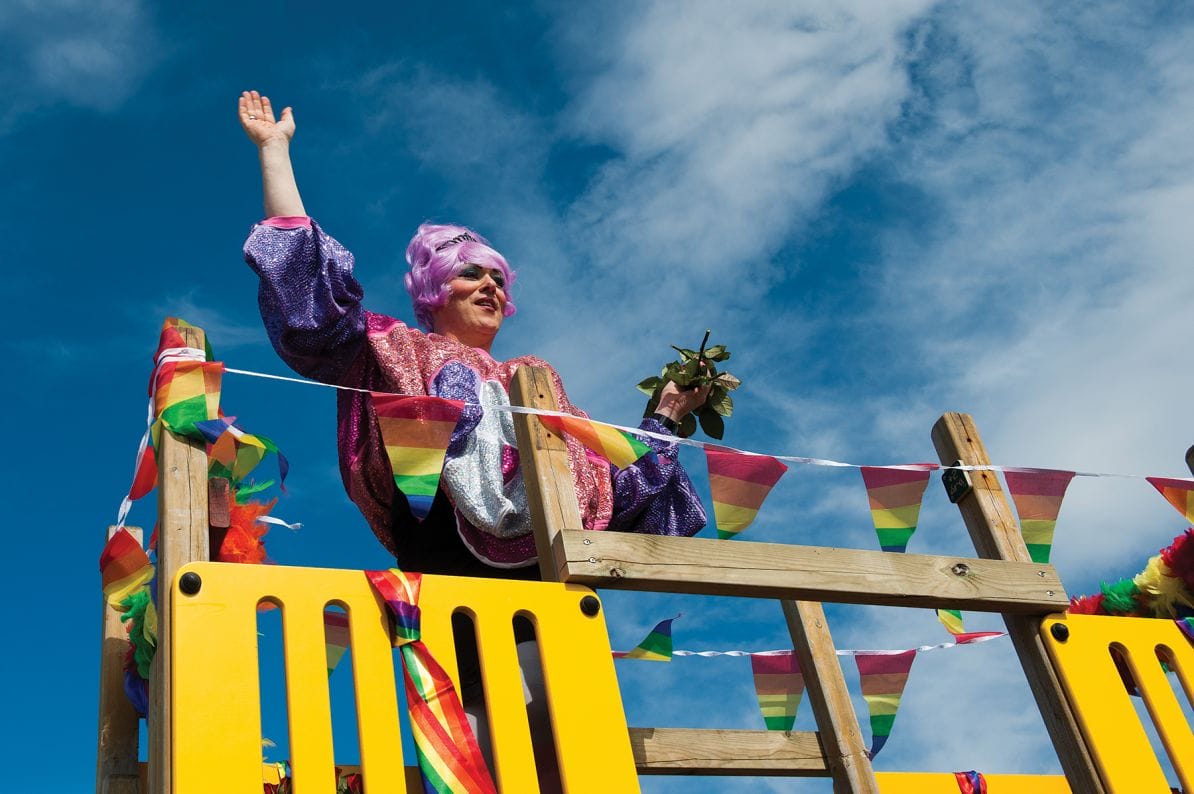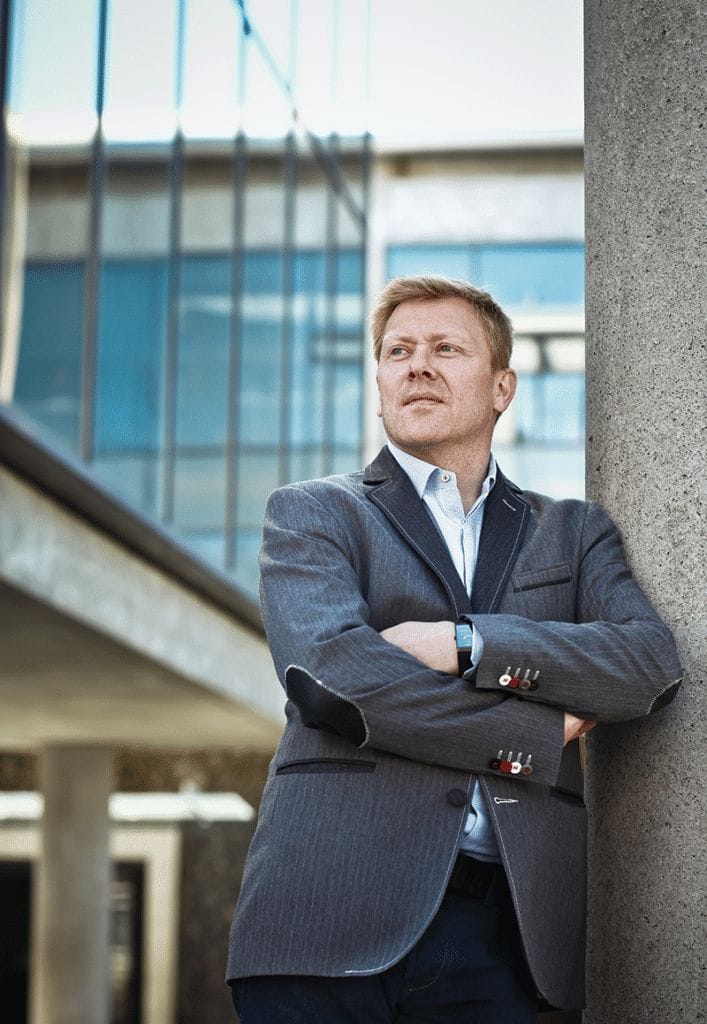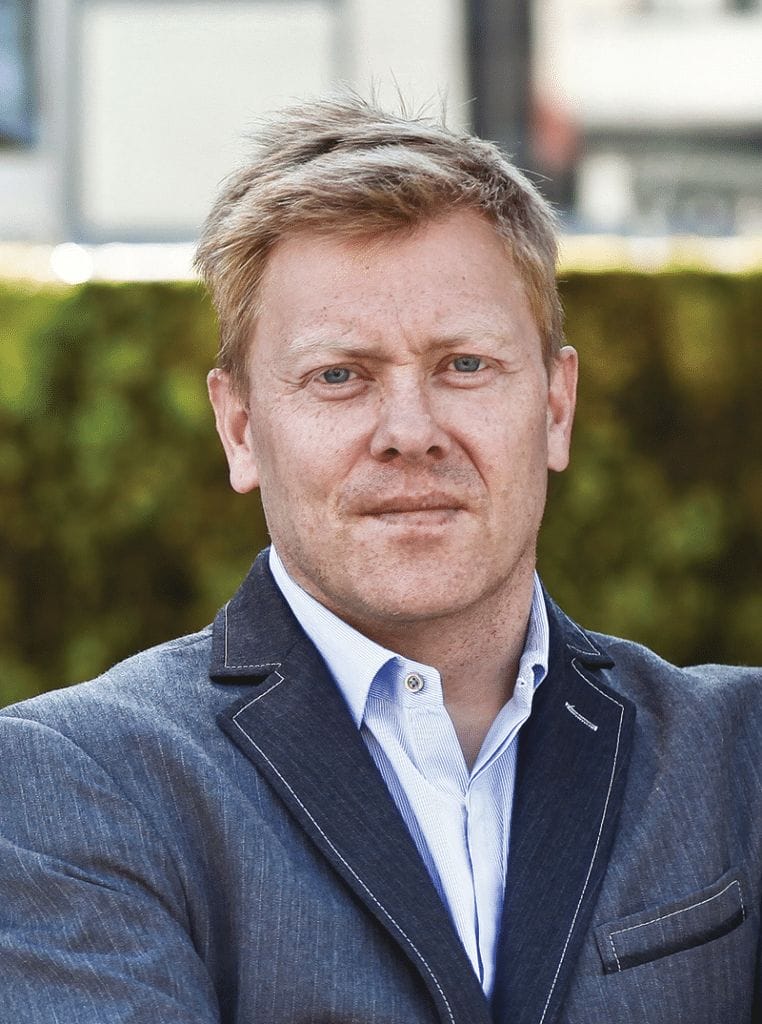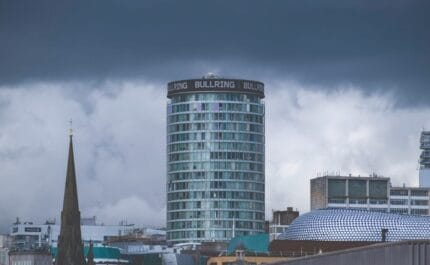“Unfortunately now my opportunities for comedy are limited”
On 15th June 2010, Iceland’s most popular comedian became mayor of Reykjavik. Two years later, Jón Gnarr spoke to Matthew Lee about his extraordinary conversion from cross-dressing clown to CEO of a beleaguered city

Photo: Geir Ragnarsson
15th June 2012 (Taken from: #7)
The mayor was nowhere to be seen. Reykjavik’s annual Gay Pride festival was in full swing and Jón Gnarr, only recently elected, had apparently snubbed the organisers. But there was something awfully familiar about the middle-aged woman in a colourful dress who clambered on stage, her hair stylishly tousled, her lipstick carefully applied. In an uncommonly deep voice, she apologised for the mayor’s non-attendance. “Although,” she added, “that’s what you get for voting for a clown.”
At the age of 11, Jón Gunnar Kristinsson – he legally changed his middle name to be spelled the way his mother pronounced it – stopped bothering with schoolwork because he’d made a life decision. He was going to be a clown. As a child with dyslexia and ADHD, he’d found school difficult; by his mid-teens he was a reluctant pupil in a boarding school for troubled children, distracted from his studies by a taste for anarchism, a glue-sniffing habit and bass-playing duties for local punk wannabes Nefrennsli (“Runny Nose”). He never seemed a likely candidate for mayor. Even if mayors in Iceland can get away with wearing drag in public.
Let’s put things in perspective. Reykjavik is tiny. You can walk anywhere in 20 minutes and it seems everybody knows somebody who personally knows Björk. Its population is smaller than that of Reading or Derby. But almost two-thirds of Icelanders live in the city, making Gnarr more powerful, in relative terms, than almost any other city leader in the world. Take that, BoJo and Bloomberg.
There was brief and fanciful speculation that a radical new political culture might spread south across the Atlantic to mainland Europe. It was called ‘Gnarrism’ – politics by people who hate politics”
In May 2010, when Gnarr’s Best Party won 34.7 percent of the vote and became the biggest group in Reykjavik city council, there was brief and fanciful speculation that a radical new political culture might spread south across the Atlantic to mainland Europe. It was labelled “Gnarrism” – politics by people who hate politics.
Gnarr’s victory appeared to mark an impassioned, defiant rejection of a political and financial elite whose selfishness and greed had dragged his country into the worst economic crisis – in relative terms – suffered by any nation in history. The likes of Geir Haarde, the former prime minister who recently avoided punishment for his role in the crash, and Davíð Oddsson, the governor of the central bank who presided over the catastrophe, had become public hate figures, symbolic of everything that was wrong with Iceland’s short-lived flirtation with wealth and power. At least the candidates of the Best Party were openly incompetent. Gnarr admitted that he knew next to nothing about politics. He certainly had no idea how to prepare a city budget.
Gnarr founded the party in late 2009. His accomplices were friends, mostly rock musicians (he used to tour with indie icons the Sugarcubes), comedians, poets and artists. None of them had previous experience in politics. They re-recorded Tina Turner’s ‘Simply the Best’ with Gnarr singing the opening lines in Icelandic: “We want a city that’s cuddly, clean and cool. And top-notch stuff as a general rule.” The second verse was rather more aggressive: “Tell the squatters in charge it’s time to leave,” they sang, attacking the political establishment. “The blathering loons should be given a new home in the city zoo.”
The party manifesto was not a serious document. They promised a Disneyland for the airport and a polar bear for the zoo. Gnarr said he wouldn’t cooperate with any politician who hadn’t seen all five seasons of ‘The Wire’. They promised to make parliament drug-free by 2020. They promised to abolish all corruption by being openly corrupt. They also promised to break all their promises.
They were initially, by Gnarr’s own admission, a joke party, an attempt to undermine the political elite that had brought Iceland to its knees. And when they won, they promised that: “Jón Gnarr will first and foremost be a fun mayor.”
At Gay Pride, Gnarr the clown was certainly having fun, but behind the eyeshadow and mascara, Gnarr the politician was experiencing a baptism of fire. The city council had to prepare the following year’s budget and it became clear that Gnarr would have to announce serious cutbacks. He had to choose which services would be cut, which taxes would be increased, and which municipality workers would be made redundant. “It was one of the most horrible times in my life,” he tells me from City Hall in a stuttering English that picks up speed over the course of the conversation. “To be honest, it was absolutely terrifying.”
Type ‘Jon Gnarr’ and ‘Hitler’ into YouTube and watch footage of the mayor with a toothbrush moustache, sieg-heiling and singing ‘My Way’”
Was this the moment that Jón Gnarr ceased to be a comedian? Is it even possible to be a comedian and a politician at the same time? “Well, it’s a paradox,” he replies. “It’s a contradiction but being a comedian has always been part of who I am. It’s like being gay. My current circumstances don’t change the fact that I’m a comedian. Unfortunately now my opportunities for comedy are limited, although I’m always desperately looking for ways to be myself, to be the comedian, and right now I’m having a beautiful Obi-Wan Kenobi costume made and I plan to wear it in public.”
Gnarr has squeezed in a little stand-up comedy since becoming mayor, but it’s not quite the same. “The heckling is very different,” he says. “People will shout ‘what about the kindergarten?’ How do you respond to that?”
As a comedian, Gnarr was no stranger to controversy. In the late-1990s, he was part of the team that produced ‘Fóstbræður’, a sketch show famed for its dark humour. Type “Jon Gnarr” and “Hitler” into YouTube and you’ll see footage of the mayor with a toothbrush moustache, sieg-heiling and singing Frank Sinatra’s ‘My Way’ at a karaoke club. But Gnarr’s most famous role is that of Georg Bjarnfreðarson, a communist supervisor at a Reykjavik petrol station in TV drama ‘The Night Shift’. After three series it was turned into a movie, ‘Mr Bjarnfreðarson’, which was so successful in Iceland that it beat ‘Avatar’ at the box office on its opening weekend.
The film’s success confirmed Gnarr’s status as one of the country’s most popular entertainers, but he doesn’t believe his celebrity rendered the mayoral election an ‘X Factor’-style popularity contest. Instead, he argues, in a country as small as Iceland, it was all about the personal touch. “I think my case was more to do with who I am in this country,” he says. “Life in Iceland happens on a personal level and I’ve been working for almost 25 years here, much of it at a personal level, as a stand-up comedian, and I think people generally think I’m a nice person. I think the main reason people voted for me was because they knew me.”
Of course, another reason they voted for him was because he and his party were entirely untainted by a financial crisis in which approximately a third of the population lost their life savings. In a matter of weeks, Iceland went from being one of the richest countries in the world to one that had to beg for a bailout from the International Monetary Fund. The three biggest banks in the country, Kaupthing, Glitnir and Landsbanki, collapsed under the weight of an $85bn debt, the equivalent of 850 percent of Iceland’s GDP.
As well as being a diplomatic disaster – the governments of Britain and the Netherlands are still trying to get Iceland to cover the cost of reimbursing 400,000 customers of Icelandic banks – it was a humiliation. Geir Haarde and the entire government resigned in January 2009 to a backdrop of riots and social unrest. Over the following weeks and months, revelation after revelation emerged about the corruption, nepotism, criminality and sheer incompetence that appeared to have been endemic among Iceland’s political and financial elite.
Gnarr was angry with the individuals who had let down the country. He told one interviewer that his goal was to break up the political system but that it was necessary to infiltrate it in order to destroy it. However, two years into his planned four-year term, Gnarr seems to have softened his stance. When announcing his cost-cutting measures to City Hall in late 2010, he was already in a reflective mood.
“I reserved my fiercest anger for the politicians,” he said. “Every last one of them was an incompetent, self-serving idiot, I thought. But I have forgiven them. I have found out that they are not selfish and stupid jackasses, like I had thought. They are merely people like everyone else. A lot of them are even good, smart people… Mistakes were made, but to err is human. Most people are just trying to do their best.”
As a lifelong anarchist, a fan of English punks Crass and a student of Mikhail Bakunin, Jón Gnarr’s sympathy for the politicians he once despised feels like a kind of reverse Stockholm Syndrome; the subversive interloper aiming to crush the system, only to discover the enemy’s inherent humanity and become part of the system himself.
But he insists that the system remains the problem. “I thought politicians were evil but that’s not the case,” he replies. “The fault is not the people in the system but with the people who make the system. The situation was caused by capitalism and globalisation – an advanced form of capitalism overpowered the political system.”
The financial system misled everybody, Gnarr argues, from members of the public to bankers and politicians. “People weren’t aware of the reality,” he says. “We thought we were players when we were really just being played… It’s kind of a Hobbiton here in Iceland – we’re all Hobbits, so naive… People underestimated the ruthlessness of capitalism.”
As mayor of Reykjavik, Gnarr isn’t invested with the necessary powers to bring down global capitalism, but he hopes to inspire change at a local level. “I believe my very presence within the structure is significant,” he says. “I feel what I’m doing is making a new space within this culture. I’m not a typical politician and perhaps I’m making it easier for people to follow in my footsteps. The political system is dominated by alpha-type people, those who are well educated, clever and able to be manipulative when they need to be.”
While it’s gratifying to know that beta-types lacking education and Machiavellian guile can win an election in Hobbiton, it’s less clear whether Gnarrism is exportable. Would London have considered a mayor who didn’t have the arrogance or bottomless ambition of a Boris or a Ken? “Well if some prominent comedian, say Eddie Izzard, entered into politics in the UK he would be crucified,” says Gnarr. But the Best Party, which, as Gnarr often reminds people, will never be a real political party, is having a little bit of impact overseas. They’ve been in informal contact with the Pirate Party in Sweden and Germany, an organisation opposed to intellectual property rights.
When asked about his achievements in office, Gnarr speaks at length about how his party is advancing e-democracy in Iceland. A website, Better Iceland, created by programmers Gunnar Grímsson and Róbert Bjarnason, won a European eDemocracy Award in 2011. He says he’s also working on improving public transport, and that he’s obsessed with planting trees. He’s now the longest-serving mayor since 2003 and he says he’s proud that all six Best Party members who entered City Hall two years ago are still standing. There have been setbacks, including controversy over his handling of debt-saddled Reykjavik Energy and discontent over his plans for a new rubbish removal system, and over the past year his approval ratings have dropped. The Best Party certainly aren’t guaranteed success at the polls in 2014. In fact, it’s quite possible the Best Party won’t exist by the time the next mayor is inaugurated.
“I have 735 days left in office,” Gnarr replies in a flash when asked what his future plans are. “Yes, I’m counting. I honestly don’t know what I’d like to do afterwards. Sometimes I think I have to continue because there’s so much to do and at other times I just wait with anticipation for the moment I can walk out and say: ‘You can find someone else now.’ On some days I think I’d like to be mayor for the next 12 years, and on other days…”
He pauses. “On other days I scan Google Earth looking for nice places to escape to.”
Slow Journalism in your inbox, plus infographics, offers and more: sign up for the free DG newsletter. Sign me up
Thanks for signing up.










